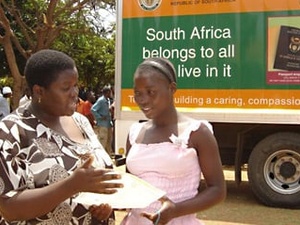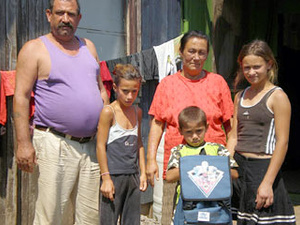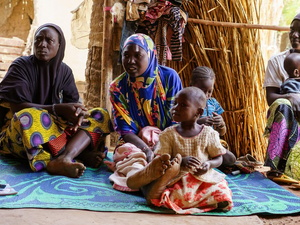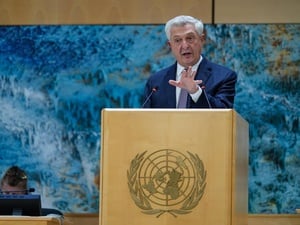Regularization and integration are key to addressing human mobility in the Americas
Regularization and integration are key to addressing human mobility in the Americas

Raul and his toddler receive their documents in Colombia, where a regularization programme is facilitating the socio-economic inclusion of Venezuelans refugees and migrants.
PANAMA CITY – The efforts of documentation of Venezuelan refugees and migrants in Latin America and the Caribbean should be enhanced to ensure their integration in host countries and prevent the increase of irregular movements in the Americas. The alert was made today by UNHCR, the UN Refugee Agency, and the International Organization for Migration (IOM), which highlighted the importance of regularization mechanisms for refugees and migrants as the best way to include them in the hosting countries.
“Regularization and documentation of refugees and migrants remain the first way for the socio-economic inclusion of the vast majority of these women, children, and men so that they can make a full contribution to the countries and communities hosting them,” said Eduardo Stein, UNHCR and IOM Joint Special Representative for Refugees and Migrants from Venezuela.
Thousands of Venezuelan refugees and migrants have begun their integration journey in Latin America and the Caribbean, buoyed by formal recognition of their residency or refugee status, according to statistics provided by countries in the region. These findings underscore the importance of effective documentation mechanisms in addressing the significant human mobility challenges in the Americas.
A recent survey of Venezuelans in Colombia carried out by UNHCR and IOM showed that 91% of them want to stay in the country, while only 1% of the respondents had the intention of going to another country. Of those who said they wanted to leave; the vast majority were undocumented. This indicates that those with valid documents were less likely to move to other countries, thus confirming that documentation is a key element to help stabilize populations.
Venezuelans are the largest population in human mobility in the Americas, with some 6 million living in Latin America and the Caribbean. According to the Interagency Coordination Platform for Refugees and Migrants (R4V) from Venezuela, more than 4.3 million residence and regular stay permits have been granted.
The promotion of stability for communities of destination, origin, transit, and return is one of the pillars of the Los Angeles Declaration on Migration and Protection, a hemispheric agreement adopted by 21 governments throughout the Americas that aims to create proper conditions for migration, strengthening international protection and cooperation. It is also at the heart of the Quito Process, a group of 13 Latin American countries that exchange information and good practices to search for coordinated solutions to the mobility of Venezuelan citizens in the region.
“Helping refugees and migrants to achieve long-term solutions, by accessing basic rights and services, the formal employment market, and helping boost the local economies as a means to rebuild their lives, is critical to addressing these movements,” said Eduardo Stein. “The international community needs to intensify its support for these efforts, and also help countries to ensure that those who have received a permit and/or a residence can have effective access to rights.”
Several countries are already facilitating documentation and seeking solutions to regularize and offer protection to refugees and migrants via different instruments in their national legislation. A positive example of promoting inclusion is the recent announcement by the Government of Peru to regularize foreigners, including refugees, migrants, and asylum seekers, who entered the country regularly or irregularly after October 2020. The decree also waives fines for foreigners who have not extended their residency permits on time and are in an irregular migratory situation.
Initiatives in Belize, Bolivia, Colombia, Costa Rica, Ecuador, and the Dominican Republic, as well as the application of the Mercosur Residence Agreement in Argentina and Uruguay are enabling access to vital rights and services for many. In Colombia, 2,5 million persons have been registered on the Temporary Protection Status, with 1,6 million of them already with their residence permits in hand.
Brazil has facilitated the documentation and regularization of all Venezuelans in its territory by granting them residence permits or refugee status. Brazil’s strategy of voluntarily relocating Venezuelan refugees and migrants from the border state of Roraima to other Brazilian cities that offer better perspectives of socio-economic inclusion has benefited over 100,000 people since it was launched. In Dominican Republic, more than 43,000 Venezuelans have registered to extend their stay and, since April 2020 to April 2023, more than 24,000 have received their work visa.
For additional information:
In Panama:
- Luiz Fernando Godinho, UNHCR, [email protected] +507 6356 0074
- Gema Cortes, IOM, [email protected] +507 62694574






